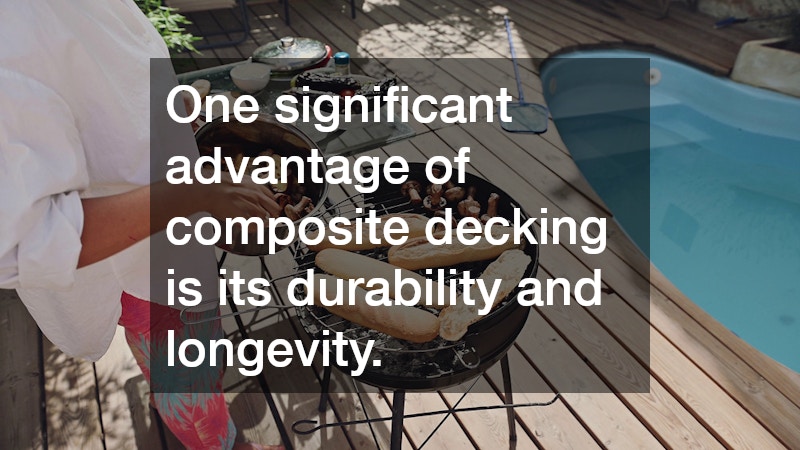Composite decking has become a popular choice for homeowners looking to enhance their outdoor spaces. This innovative material is made from a mix of wood fibers and plastic, providing a durable and low-maintenance alternative to traditional wood decks. Before diving into a composite decking project, it’s essential to weigh the advantages and disadvantages.
As experienced composite deck builders will attest, understanding these key aspects can help homeowners make informed decisions. While composite decking offers numerous benefits, it is not without its potential drawbacks.
In this article, we’ll explore the various pros and cons of composite decking to aid in your decision-making process.
Recognizing the features of composite decking can ensure that your investment aligns with your outdoor living aspirations. Whether you’re dreaming of a new deck or considering a replacement, understanding the full picture is crucial. Let’s delve into both the advantages and potential drawbacks of choosing composite materials for your deck.
The Pros of Composite Decking
One significant advantage of composite decking is its durability and longevity. Unlike traditional wood decks, composite materials are resistant to rot, insect damage, and the harsh effects of weathering. This results in a sturdy deck that can last for many years with minimal maintenance.
Composite decks are also renowned for their low-maintenance requirements. Homeowners can save time and money, as composite decks do not need regular staining, painting, or sealing. A simple occasional cleaning is typically all that’s required to keep a composite deck looking new.
Furthermore, composite decking offers a wide range of color and texture options to suit various design preferences. The ability to mimic the look of wood without its associated downsides is a major draw for many homeowners. This versatility allows for seamless integration with existing home aesthetics and landscaping.
The Cons of Composite Decking
One major downside to composite decking is its initial cost, which is generally higher than that of wood. Although the long-term savings on maintenance can offset this, the upfront investment may be a deterrent for some homeowners. This higher cost can also affect budgeting and planning for home improvement projects.
Another consideration is that composite decks can become hotter than wood under direct sunlight. This can make the surface uncomfortable to walk on during sunny days, especially for households with pets or small children. Homeowners may need to consider additional shade or cooling options.
Despite improvements in technology, some composite decks can still appear artificially manufactured. For those who cherish the authentic aesthetic of natural wood, this can be a drawback. However, consulting with experienced composite deck builders can help in selecting high-quality products with a more natural appearance.
Environmental Impact of Composite Decking
Composite decking often incorporates recycled materials, which can make it a more environmentally friendly option compared to traditional wood. By using recycled plastic and wood fibers, composite decking contributes to the reduction of waste in landfills. This aligns with many homeowners’ values of sustainability and eco-conscious living.
However, there are environmental considerations to keep in mind with composite decking. The production process for composite materials can be energy-intensive, and the use of some additives or bonding agents may raise sustainability concerns. It is crucial for homeowners to research and choose products manufactured with environmental responsibility in mind.
As the demand for composite decking grows, more manufacturers are committing to sustainable practices and transparent sourcing. Homeowners interested in green living should inquire about a manufacturer’s environmental policies. Opting for certified products can ensure that your composite deck is both beautiful and sustainable.
Composite decking offers a wealth of advantages, from durability to design flexibility. Yet, weighing the initial cost and other potential drawbacks with your long-term goals is important. Speaking with experienced composite deck builders can provide valuable insights tailored to your specific needs and concerns.
It’s clear that composite decking presents both an opportunity and a challenge for modern homeowners. Understanding these pros and cons helps ensure that your chosen deck solution enhances your home while aligning with your lifestyle and values. Making informed choices reduces the risk of future dissatisfaction, allowing you to enjoy your outdoor space to the fullest.
In conclusion, the decision to go with composite decking requires thoughtful consideration and due diligence. Evaluating the various elements discussed here can pave the way for a satisfying outdoor enhancement. Whether your priority is low maintenance, eco-friendly options, or stylistic variety, composite decking holds potential that is worth exploring.




